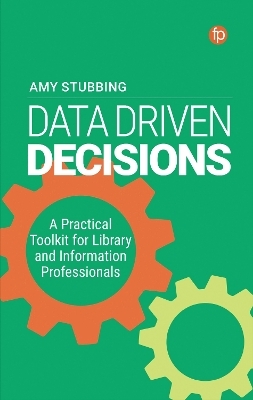
Data-Driven Decisions
Facet Publishing (Verlag)
978-1-78330-478-3 (ISBN)
Data-Driven Decisions: A Practical Toolkit for Library and Information Professionals is a simple, jargon-free guide to using data for decision making in library services. The book walks readers step-by-step through each stage of implementing, reviewing and embedding data-driven decisions in their organisation, providing accessible visualisations, top tips, and downloadable tools to support readers on their data journey. Starting with the absolute basics of using data, the author creates a framework for building skills and knowledge slowly until the reader is comfortable with even complex uses of data.
The book begins with an exploration of the foundations of data-driven decisions in libraries including a look at the impact of the current financial climate on resources, theoretical foundations of data collection and analysis, and how this book can be used in practice. The next section takes readers through the data-driven decisions model, providing a guide for understanding and a manual for implementation of the model. Finally, the book provides further perspectives and reading surrounding analysis and implementation of data-driven decisions. This section aims to give supplementary and focused information on different areas of data-driven decisions which can be included in processes once the reader understands the foundation of the book from earlier chapters.
Highly practical and written in an accessible style, this book is an essential resource for librarians and information professionals who increasingly need to justify decisions on programmes and services through quantifiable data.
Amy Stubbing has had a varied career across different sectors, and has held roles in areas including collection management, customer services, and library management. She is currently Academic Engagement Lead at University of Westminster where she is responsible for strategic planning and development of the learning support provision for the university, including academic liaison and academic learning development. Previous roles include Campus Library Manager at University of East London, and the Library Customer Care Collections Coordinator at Royal Holloway University. Amy’s interest in data and using it to inform service decisions and developments to improve user experience has been a core part of her career. She has a particular passion for developing data literacy and embedding data practices into all decision making, which led to her developing her Data Driven Decisions toolkit for libraries. She has worked with numerous university libraries to begin working towards embedding a culture of data-driven decisions, and has used her varied experience of teaching data literacy to further develop her toolkit, culminating in this book.
PART 1 BACKGROUND
1 Introduction
2 Using the Toolkit
PART 2 THE TOOLKIT
3 Step 1: Identify
4 Step 2: Collect
5 Step 3: Map
6 Step 4: Analyse
7 Step 5: Act
8 Step 6: Review
PART 3 GOING FURTHER
9 Moving from a Transactional to a Transformational Service Using Data by Helen Rimmer
10 Collection Mapping for Collection Management
11 User Experience and Qualitative Data by Emilia Brzozowska-Szczecina
12 Alternative Data Sources: Using Digital and Social Media to Inform Management Decisions in Your Library by Leo Appleton
13 Starting from Scratch: Building a Data Culture at the University of Westminster by Sarah Maule
14 Back to the Drawing Board: How Data Visualisation Techniques Informed Service Delivery during the COVID-19 Pandemic by Elaine Sykes
| Erscheinungsdatum | 28.07.2021 |
|---|---|
| Verlagsort | London |
| Sprache | englisch |
| Maße | 156 x 234 mm |
| Themenwelt | Schulbuch / Wörterbuch ► Lexikon / Chroniken |
| Informatik ► Datenbanken ► Data Warehouse / Data Mining | |
| Sozialwissenschaften ► Kommunikation / Medien ► Buchhandel / Bibliothekswesen | |
| ISBN-10 | 1-78330-478-2 / 1783304782 |
| ISBN-13 | 978-1-78330-478-3 / 9781783304783 |
| Zustand | Neuware |
| Informationen gemäß Produktsicherheitsverordnung (GPSR) | |
| Haben Sie eine Frage zum Produkt? |
aus dem Bereich


